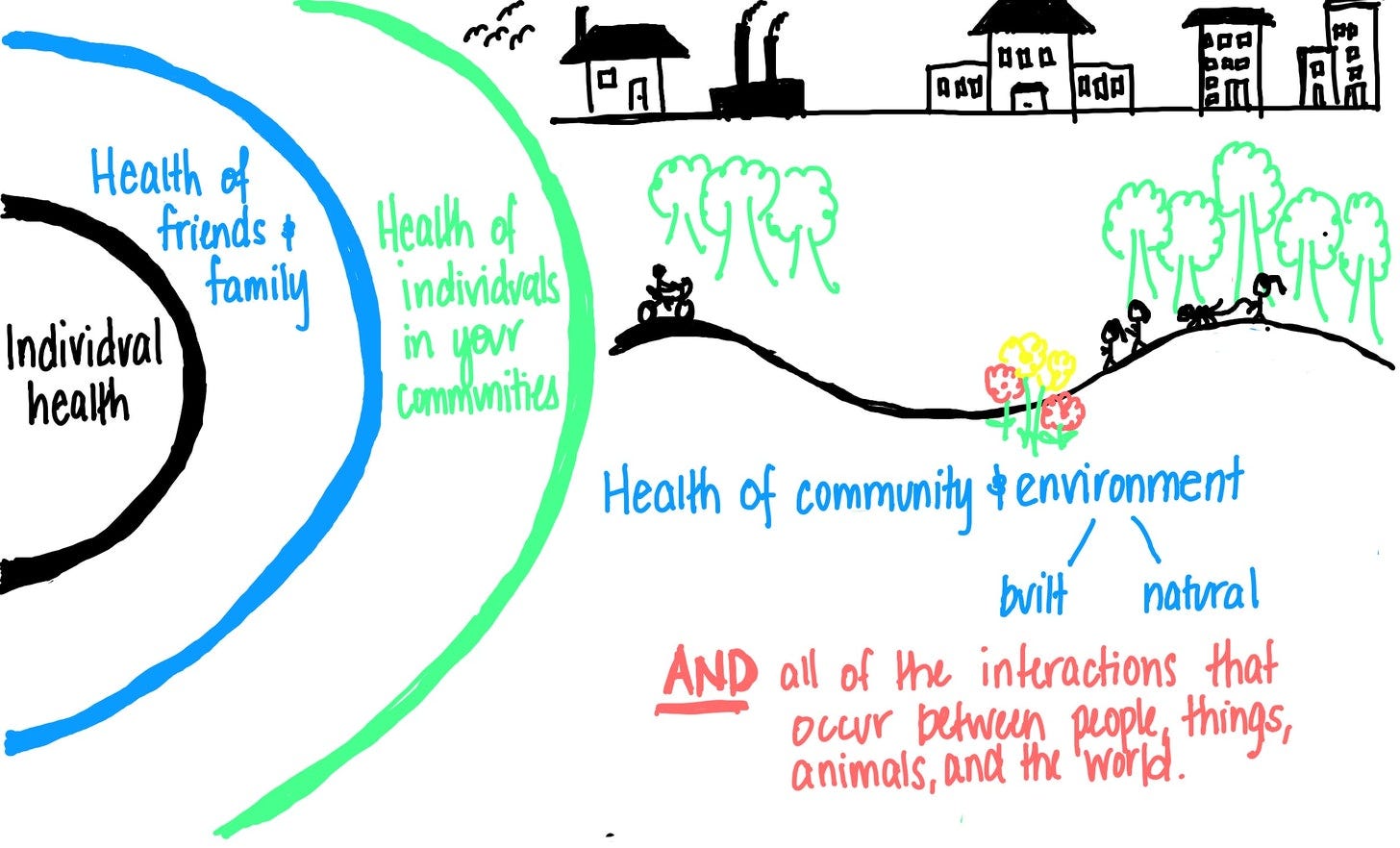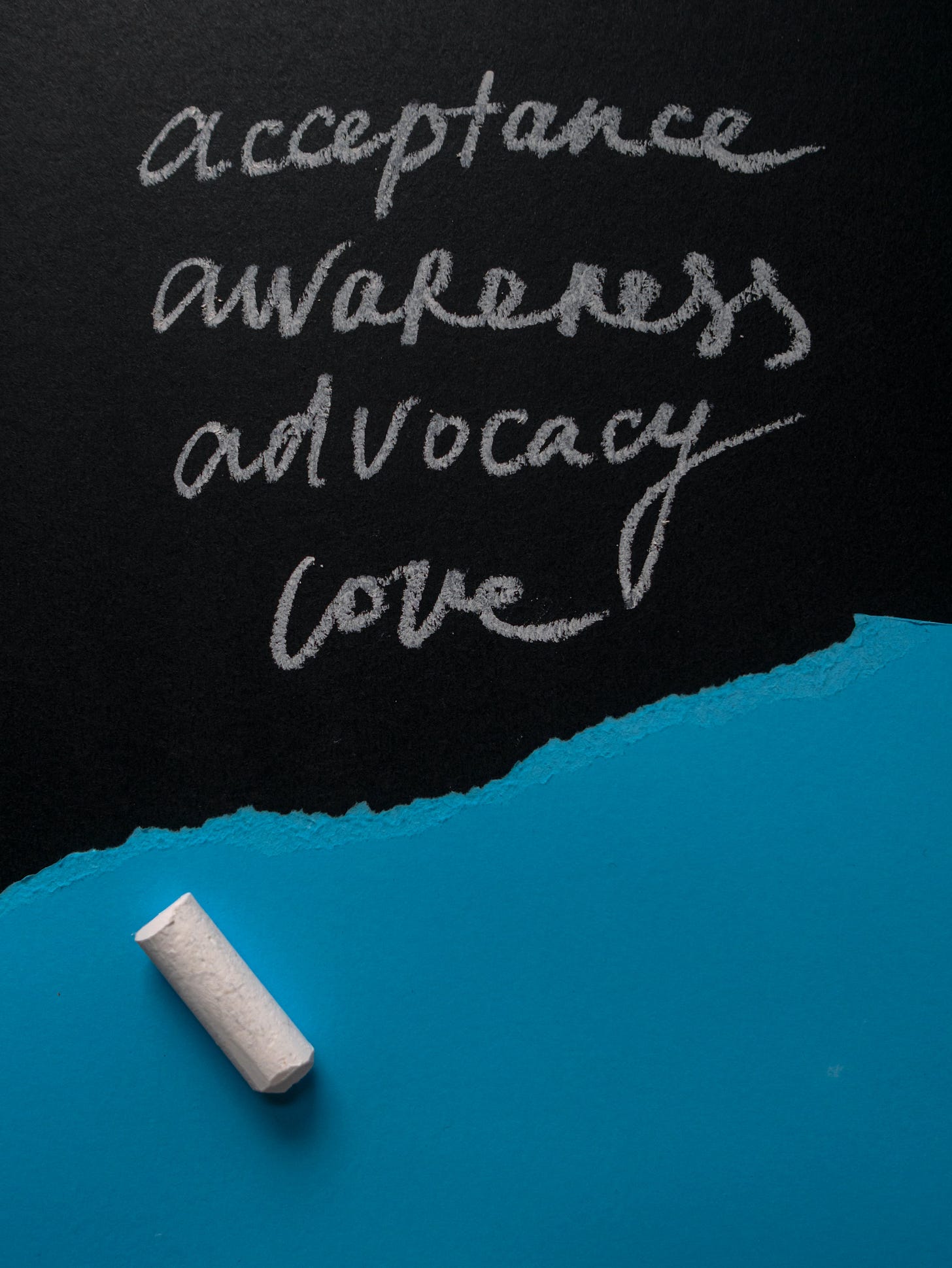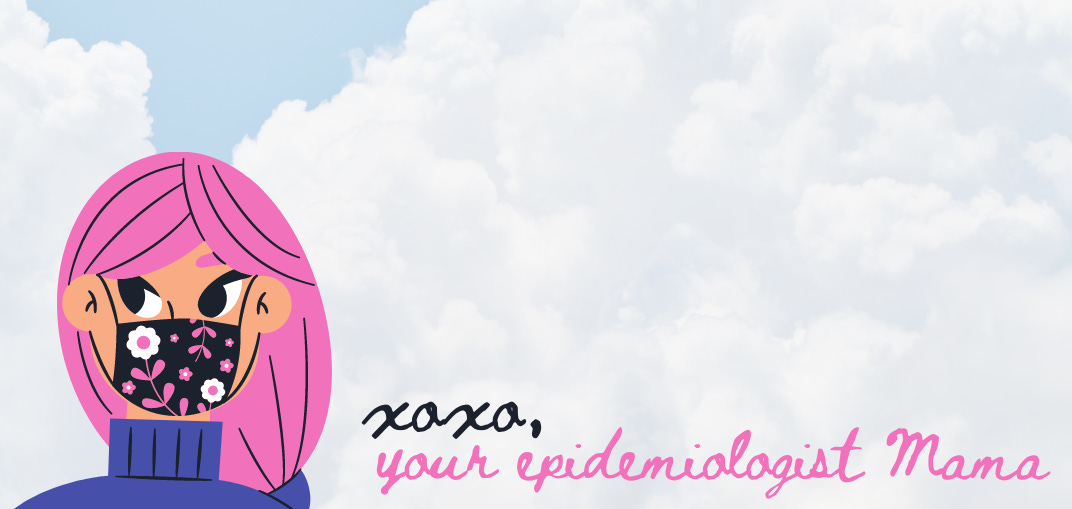Imagine the Next Normal -- Community Health
Part #4 in a series focused on creating healthier and safer communities for all
I am pushing back HARD against the desire to return to normal.
Instead of wanting to return to what was pre-COVID, I am stepping into the future — the NEXT NORMAL — with the hope that we can create healthier and safer communities for all. Returning to 2019 normal is unacceptable. PERIOD. It is unacceptable because we have all changed, grown, and learned so much living through (read: surviving) a pandemic.
I invite you to explore this NEXT NORMAL with me in this 10-part blog series (yes, I am fired up, inspired, and really excited). If you are jumping in today, please go back and read my inspiration for the series as well as my posts on physical health & access to healthcare, mental health, and social & emotional health.
(I know I have said this before, but it begs repeating) My purpose in life is to create healthy communities. I am committed to preventive healthcare; love research; advocate for vaccines; and have dedicated my career to educating others (from emerging public health practitioners to members of my family, from politicians to business owners). Using my knowledge and my voice to educate, explain, answer questions, and provide science-based assurances throughout the pandemic is what I was called to do. I love writing posts like this, being on TV, and working with my community (local and global) to create healthy communities.
Knowing all of this, you might be surprised to know that pre-pandemic I struggled with imposter syndrome, was unclear about my long-term goals, and was timid and afraid to share my opinions (and sometimes so insecure that I would not correct someone who referred to me as Mrs. instead of Dr).
In the words of the late Madeleine Albright —
“It took me quite a long time to develop a voice, and now that I have it, I am not going to be silent.”
I found my voice during the pandemic.
And throughout the pandemic, the underlying current of my work has centered around the message that —
“Being healthy is more than individual actions (eat well and exercise); being healthy must also include creating and sustaining healthy communities.
And that we can all be healthy by adopting a shared mission to love our neighbors.”
CREATING A HEALTH(ECO)SYSTEM
Public health can no longer be just a field of study or branch of government. It needs to be included in a revolutionized redefinition of HEALTH.
Our Health(eco)system.
We all need a healthy environment in which to live. We need access to care, affordable health care, safe places to exercise, safe schools, access to food, clean drinking water, proper sanitation, buildings with adequate air circulation, and so much more…
Our whole health(eco)system needs to be healthy.
Our definition of what it means to be healthy needs to shift drastically. We need to add to the definition of health and reframe our thinking about being healthy to include individual actions PLUS working towards healthy families, healthy communities, and healthy environments.

A healthy health(eco)system requires that we have access to affordable healthcare for all. Everyone needs their own healthcare provider - regardless of insurance status, where they live, how old they are, if they are homeless, or what previous health conditions they have suffered from.
A healthy health(eco)system requires that we have safe schools and workplaces. And that our transportation systems are safe — we need bike routes, laws to prevent motor vehicle crashes, and protocols in place to ensure public transportation is safe.
A healthy health(eco)system also means we have safe drinking water, proper sanitation, clean air to breath, fresh food, food that is free from pesticides, food that is not contaminated with infectious diseases (there are so many lessons to learn from the hepatitis C outbreak in ChiChis restaurant near Pittsburgh, PA), vaccines to prevent the spread of disease, and fluoride in drinking water.
In our healthy health(eco)system, we need to have conversations about sexually transmitted diseases — and not use those conversations as a scare tactic to stop kids from having sex (because let’s face it, this has never worked). We need to talk about disease spread and how to prevent it. We need to stop stigmatizing sexually transmitted diseases. PERIOD. We need to shift conversations to prevention, diagnosis, and treatment.
We also need to educate kids about the dangers of smoking (or vaping) to themselves and their communities.
We need to slow the spread of opioid use.
The list of activities to create a healthy health(eco)system is long. And the work will involve all of us. But this is work that needs to be done because, if we have learned anything during the pandemic it is —
When our health is threatened, everything — from our economy to education, our day-to-day activities to our future plans — are disrupted, threatened, and challenged.
Having a healthy health(eco)system must be the basic tenet of our lives as we enter and sustain the next normal.
TO DO THIS — we must love our neighbors
The origins of the command to love your neighbor rest in Judaism/Christianity. I bring this up to both give credit but also to link the idea of a health(eco)system to our sense of faith and spirituality. Many of us believe in a higher being. And connecting to something or someone spiritually is part of being healthy (yes, this likely means post about spiritual health!). As we move forward thinking about a healthy health(eco)system and redefining health (as a whole), I think connecting our words and actions to beliefs and practices that are greater than us as individuals or as a community is essential. Loving our neighbors can be a bridge to spiritual health (regardless of religion).
Loving your neighbor is an action (not a feeling). You need to work to create a healthy space for your neighbor and protect their health, not befriend them. Additionally, this call to love your neighbor is rooted in the —
recognition of our shared humanity.
We all breathe the same air, drink the same water, eat food from the same places, and we are all trying our best to live out our mission and leave the world a better place than when we entered it.
Regardless of origin, we must start by adopting a shared mission to love our neighbors. We must care for each other and work collectively to slow the spread of all infectious diseases. To do this, we must all agree to the following —
Stay home when you are sick.
While you might be able to go to work and push through with a cold, stay home. Keep your germs to yourself. Do not expose others; stop the chain of transmission from person to person. This also means we must also keep our kids out of school when they are sick.Wear a mask if you are sick must go to work or school.
Encourage people to seek out testing and treatment. NORMALIZE THIS.
Do not make fun of someone or out them for testing positive for COVID. Or the flu. Or for having lice. These are infectious diseases; they are not a joke nor should we be gossiping about them. Diagnosing an illness allows for proper treatment and slows the spread of disease. Let’s work to create a healthcare system where seeking testing, getting diagnosed, and receiving treatment and instructions for isolation are the basic tenants of the healthcare system and the rights of all individuals.Advocate for people, policies, practices, and programming that will create health(eco)systems. We need policies to ensure proper sanitation in our communities; just like we need amazing (thoughtful, centered around consent) sex education in our schools. We need to fight tobacco companies and work to ride the world of e-cigarettes/vapes. We need clean air to breathe and transportation laws that protect all drivers on the road.
We need to fight for health with our voices, votes, and actions.
Regardless of your political affiliation or the community where you live, I believe we all want to live healthy lives. And I would hope that we all want to leave the world a healthier place for our children and our children’s children.
To be healthy and to pass on health to our children, we cannot think of health as an individual action. It is NOT just — well, I’ll be healthy and that is enough. I’ll exercise, eat well, and take my cholesterol-lowering medication. If we all simply focus on our own individual health, our communities will fall apart. If we forget that clean air, water, and food are part of being healthy, we cannot be healthy. If we don’t insist on high-quality health education, fight to keep cigarettes out of the hands of our youth, talk about sex, disease, and vaccines — we will not be healthy.
We must accept and bring awareness to the fact that being healthy must include individual and collective action to create a healthy health(eco)system.
We must advocate for creating a healthy community.
And we must work to create a healthy community by loving our neighbors.
The work that we have ahead of us — create healthy health(eco)systems— involves each of us. And while the public health officials, politicians, and community leaders can lead this work, this work has been assigned to each of us.
We are all public health. We need each other; life is a team sport.







This series of articles is outstanding. I think that linking public health practices to religious concepts is an excellent idea.